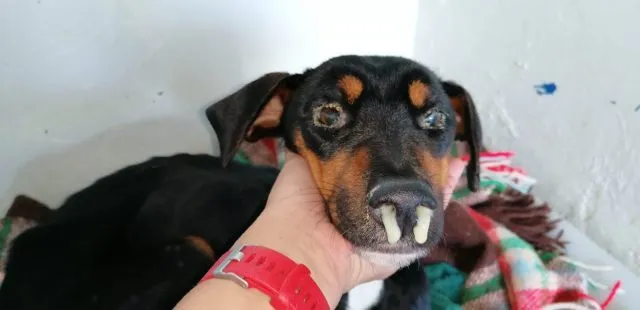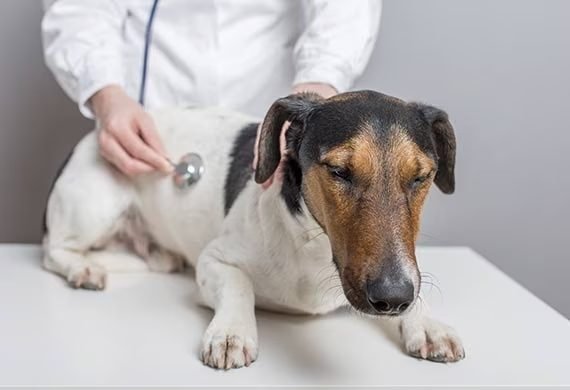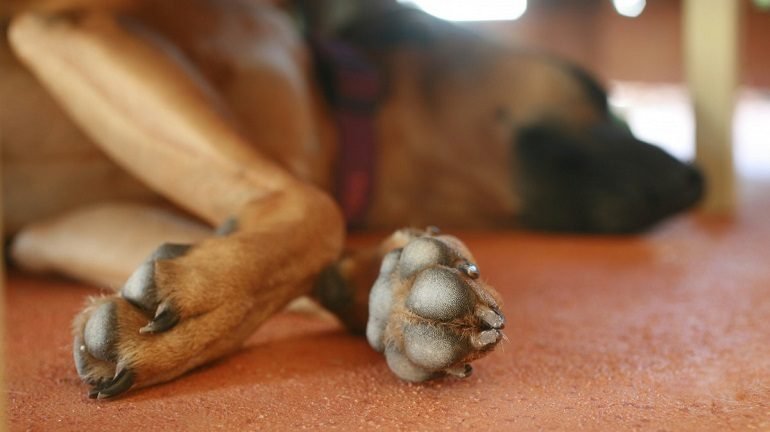Overview

What is distemper?
Distemper is a nasty virus that attacks several different organs in the body including the guts, heart, immune system, lungs, brain, and nerves. Distemper causes a variety of symptoms ranging from mild cold-like signs to seizures and death. It spreads in air, and bodily fluids (such as urine and saliva), and can live in the environment where an infected dog has been. Young, unvaccinated dogs are most at risk.

What are the symptoms of dogs with distemper?
Symptoms of distemper vary a lot, depending on which organs are affected and how much resistance (immunity) a dog has. Dogs can show any combination of the following symptoms:

Distemper often starts by causing runny eyes, a cough, and diarrhea, then after 3-4 weeks starts to cause hard pads, a hard nose, and neurological signs (fits, tremors, and seizures).
When to contact your vet?
Contact your vet if your dog starts showing symptoms of distemper, especially if they haven’t been vaccinated.
Treatment?
There is no specific medicine that we can use to treat distemper (antibiotics don’t work because it’s a virus, not a bacteria) so instead, treatment involves supporting your dog’s body while they try to fight the infection.
Vaccination?
In Morocco, distemper is widespread, and unvaccinated dogs are still at risk. Fortunately, it’s easy to prevent by vaccinating puppies before they are let out into public/allowed to mix with other dogs, and by giving adult dogs booster vaccinations throughout their life.
Cost?
Treatment for distemper can become very expensive. Bills can mount into hundreds, if not thousands of dirhams if your dog requires a long stay in a veterinary hospital and ongoing care. It’s very important to speak openly to your vet about your finances, the cost of treatment, as well as what you think is right for your dog. There might be more than one treatment option, so if one doesn’t work for you and your pet then the vet may be able to offer another.
Prioritizing dog insurance from the moment you bring your canine companion into your life is highly recommended. This proactive approach guarantees that you will have the vital financial support necessary to meet all your dog’s healthcare needs.
Taking an unvaccinated puppy outside?
An unvaccinated puppy, or a puppy that has only had their first injection has no protection against distemper or the other diseases we vaccinate against. Your puppy will be safe to go out for a walk and meet other dogs one to two weeks after they complete their first vaccination course. Until then:

| Cookie | Duration | Description |
|---|---|---|
| cookielawinfo-checkbox-analytics | 11 months | This cookie is set by GDPR Cookie Consent plugin. The cookie is used to store the user consent for the cookies in the category "Analytics". |
| cookielawinfo-checkbox-functional | 11 months | The cookie is set by GDPR cookie consent to record the user consent for the cookies in the category "Functional". |
| cookielawinfo-checkbox-necessary | 11 months | This cookie is set by GDPR Cookie Consent plugin. The cookies is used to store the user consent for the cookies in the category "Necessary". |
| cookielawinfo-checkbox-others | 11 months | This cookie is set by GDPR Cookie Consent plugin. The cookie is used to store the user consent for the cookies in the category "Other. |
| cookielawinfo-checkbox-performance | 11 months | This cookie is set by GDPR Cookie Consent plugin. The cookie is used to store the user consent for the cookies in the category "Performance". |
| viewed_cookie_policy | 11 months | The cookie is set by the GDPR Cookie Consent plugin and is used to store whether or not user has consented to the use of cookies. It does not store any personal data. |
Create an account or sign in to save pets you love.
Don't have an account? Contact us
Before you proceed with your adoption application, please review and accept our data handling practices:
Note: By clicking "I Agree & Continue", you will be redirected to an external application form. This tracking system logs your interest but does not capture data from the external form.
Create an account or sign in to save pets you love.
Don't have an account? Contact us
Before you proceed with your adoption application, please review and accept our data handling practices:
Note: By clicking "I Agree & Continue", you will be redirected to an external application form. This tracking system logs your interest but does not capture data from the external form.